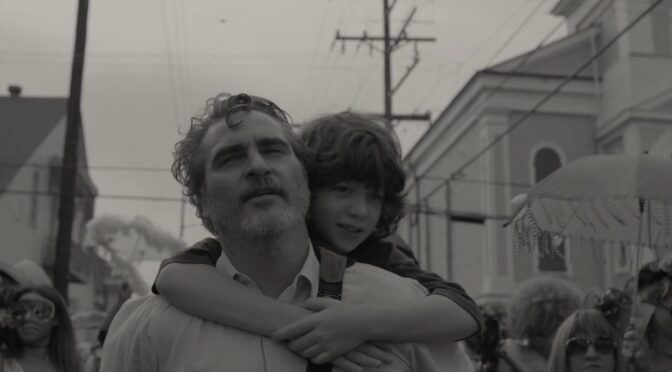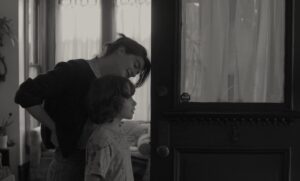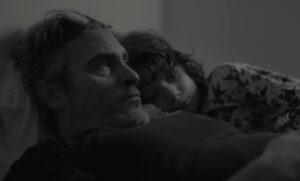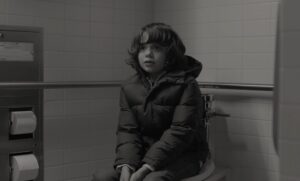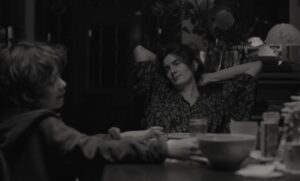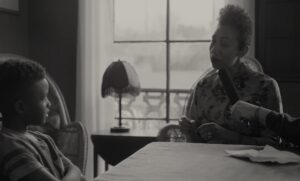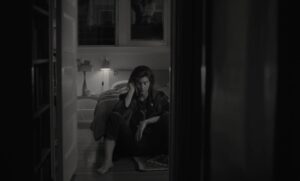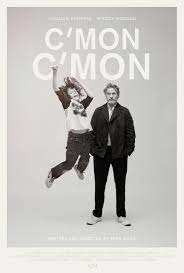
I’ll stand on my soapbox for a minute and say that, as an uncle many times over, I feel that uncles still feel underrepresented in cinema. It feels particularly tough to find good films about uncles. My people cry out for more stories. I say this as someone who never cared for John Hughes’ comedy Uncle Buck growing up and who had the pleasure of agreeing with his childhood self wholeheartedly after a recent rewatch. And, as I’m one of those snobs who can’t stand Napoleon Dynamite, I have little use for that desperate goofus Uncle Rico as well. I’m very much behind Mary Poppins‘ Uncle Albert and his laughing-on-the-ceiling shenanigans, but that’s a bit role and it’s unclear whose uncle he’s even supposed to be. It’s possible he might just have been bestowed with an honorary Uncle title, which obviously doesn’t really count. We have some very compelling uncles in The Lion King‘s Uncle Scar and Hamlet‘s Uncle Claudius (Scar’s non-lion equivalent), but those are some real unsavory uncles. Certainly not the kind of uncles anyone lucky enough to assume the title of uncle should aspire to become. The same goes for Harry Potter’s miserable Uncle Dursley. And of course, no matter how often he is reincarnated and reimagined, things don’t go ever all that well for Peter Parker’s Uncle Ben. That poor man has died a lot. So where does that leave you ifyou’re looking for an uncle in a major role, who isn’t palpably evil, whose film doesn’t suck, and who isn’t frequently dying on a sidewalk in the name of increased pathos? I feel like I’m currently looking at Uncle Fester (who, to be clear, is not dead even if he would love it if you thought of him that way) standing in a room all by himself. And we love Fester, but that is just not a satisfactory state of avuncular affairs for more than a century of cinema. That’s why Mike Mills’ C’mon C’mon hit me on such a personal level and filled me with teary joy for all the uncles out there like me. We’ve waited for this, gentlemen! Behold, a great film that not only has a really good, fully realized uncle as a leading character, but is also very much about the joys of having a nephew or niece. An arty, sweet little dedication to the bond between children and their parents’ brothers. It may seem a small thing for a film to be about, but there’s not such thing as a small thing when a filmmaker approaches it with this much clear-eyed thoughtfulness.
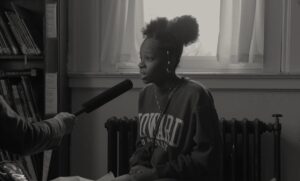
Also, being the latest film from the literate, referential and effervescently digressive Mike Mills (who last directed Annette Bening to her career zenith in his masterpiece 20th Century Women), C’mon C’mon is about a whole lot more than just nephews and uncles. Like its lead uncle Johnny (a spectacularly moving and impressively human-scaled Joaquin Phoenix), a radio journalist and interviewer, Mike Mills has a way of letting things unfold naturally, of letting the subject reveal itself. He has long been animated by a curiosity about human beings of all ages and how they grow and change. And he is gifted at allowing incredible actors to capture people at new crossroads in their lives. He has an eye for where pain, poignance, and rich humor overlap. C’mon C’mon begins with the first of many telephone conversation between Johnny and his sister Viv (Gaby Hoffman, in one of the year’s best supporting performances). The two grew up close, but have hardly spoken to each other over the past year due to a couple of draining, highly charged famiy ordeals. Their mother died recently of dementia and there was heated disagreement over how to handle her passing. This also unearthed years of resentment over their starkly different relationships with her. There was also a great deal of discord over how Viv should handle her relationship with her husband Paul, a man possibly suffering from bipolar disorder. Paul has recently separated from Viv and relocated to Oakland away from his wife and their 9-year old son Jessie (Woody Norman, in a performance as full of humor, sadness, and exquisite grace notes as any I’ve seen in some time). Paul is having trouble adjusting to a new life in a new city and Viv feels a moral duty to go help him get settled and find treatment. This gives Johnny the perfect opportunity to reconnect with his beloved sister and nephew by offering to look after him while his mother is away. It may have only been a year since they last saw each other but, as Viv reminds Johnny, a year is a mighty long time for someone who has yet to live their first decade. Johnny lets Jessie borrow his tape recorder and microphone to capture sounds and conversations as they walk around Jessie’s Los Angeles home. Eventually, Johnny convinces Viv to let him bring Jessie to New York City and later New Orleans as part of his work. It is clear from the start that Johnny and Jessie have a very strong emotional bond. It is also clear that their easy chemistry cannot entirely smooth over the fact that much does not feel right in Jessie’s life. He is anxious about his father’s departure and the reasons for it, and there is also general hyperactive ennui that comes with being nine years old. Mike Mills’ film is full of harmony and just as often punctuated with misunderstandings. It lives in the space between loving connection and missed communications, as Mills patiently and tenderly watches two good, wounded souls talk and get to understand each other. I don’t want to undersell the small traumas that all these characters are enduring and trying to make sense of, but the magic of C’mon C’mon lies in how it never feels burned out or defeated. It is a story that believes in love and healing, even if does not pretend that they are always easy to come by. The trials of these characters, from tending to an aging parent to divorce to watching a loved one admit they need psychological help, are all recognizable and relatable to a vast number of people. Mills does not minimize them but there is something soothing in how matter-of-factly he confronts them. He has made a tremendous film about acceptance and change and the power of talking it out with people who care about you. His characters’ struggles color them but they do not consume them. Big, life-altering ordeals share time with quiet moments of playful banter. Just like his interviewer protagonist, what Mike Mills wants to do most is just to listen and find some kind of peace in the free-wheeling rhythms of the dialogue.
Listening with a sense of humor and curiosity is key to Mike Mills’ approach with C’mon C’mon because that is such a vital part of communicating with children. More than just uncles and nephews, it is a film about the importance of speaking with and listening to the very young. If there is one superlative C’mon C’mon earns, it is that it may be the most astute film I’ve ever seen when it comes to presenting a truly honest view on pre-adolescent kids. It does not try to turn children into tiny, impossibly precocious adults and it does not make the other mistake of underestimating their awareness. It grasps the paradox of childhood, when one suddenly wakes up with a whole host of new ideas but still doesn’t quite have the discipline to organize all of them. As Viv puts it to her brother, his nephew is “a whole little person”, a phrase which crystallizes the full complexity of children and carries an implicit critique for how superficially and glibly the adult world often perceives them. Sadly, some of those very adults go on to make movies for and about children. C’mon C’mon isn’t just one of the least pandering glimpses into a 9-year old’s mind ever (it is the best such film since Spike Jonze’s underrated Where the Wild Things Are). It is a shot across the bow to anyone who would render child characters in a way that is cheap or lazy. It makes not pandering to children its mission statement and it features an adult character who understands and respects how important every interaction with this particular child is. Early on, when Jessie asks Johnny a serious question about why he has not married, Johnny fires out some quick, sassy, fun uncle response, but finds himself regretting it later. “I turned it into a dumb joke,” he confesses to his tape recorder. “Why did I do that?” Mike Mills understands that we should not assume we have children so easily pegged. One of the film’s most lovely and often funny decisions is just to let Jessie be genuinely weird sometimes. Because, in all honest, I’ve met precious few whole little persons who aren’t genuinely weird, in the best and most human of ways. Viv tells Johnny the night before she leaves Jessie in his care that her son will frequently play a game he made up called The Orphan. He will pretend to be a child who has escaped from an orphanage and shown up on her doorstep asking to spend the night in her house. And (here’s the gloriously macabre kicker), he offers to take the place of her dead children. Johnny greets this revealing look into this nephew’s psyche with a perfectly deadpan, “That’s fucked up.” And Mills’ perspective seems to be that, yes, it is a little fucked up and also the kind of strange little thing that happens with kids all around the world. As with so much of the character details in this film, he shrugs his shoulders with a smile and makes note of it. The joy of C’mon C’mon is that it is unafraid to be a little fucked up, and that is what makes it entirely wondrous. The beauty of Mike Mills’ look at Jessie (and children as a whole) is that he allows him to be both a disarmingly articulate little future adult and a specifically bizarre little boy, and it immediately makes this character (one of 2021’s absolute best characters) a real, breathing human being and not some cute abstraction. Mills’ film goes so much deeper than the realm of adult-kid bonding you see in a film like Kramer vs. Kramer. What we have here is a true two-hander between an adult and a child that could not feel more honest and alive. C’mon C’mon‘s dazzling magic trick is the subtle unfolding of Jessie’s foibles and nuances, so that, in no time at all, you know that Viv is right about him, This is a whole person. A fully dimensional, flawed, funny, free-thinking person.
C’mon C’mon is also quietly political in how it critiques an adult world that often reduces kids to abstractions, causes, victims, or problems to be solved. The framing device of the film’s many poignant child interviews (all of them featuring real children discussing their hopes and fears for the future) allows the film to reinforce its thesis that children are real, autonomous beings. That we should question them more and talk at them less. The film is also political in its honest insights on the burdens and patriarchal hurdles that surround motherhood. While those child interviews are giving us conversation after conversation from the perspective of youth, Johnny is also having regular phone conversations with his sister on how to be a better communicator with his nephew. He is listening, as all men should, to a mother’s wisdom no how to not only raise and instruct a child but to nurture and one. And he is allowing Viv to tell her own story to someone who will listen; someone other than her sweet-natured but often manic child. Without underlining the point too boldly, Mills is positing that our would would be vastly improved by emotional attentiveness, by having conversations with women and children where we act more as student than as teacher, and by an understanding of where we can make life less difficult for the women tasked with raising the next wave of small adults. We owe it to them and to ourselves to lean in closely and bear witness to anyone who is helping to make the world’s little persons whole. Mike Mills follows Johnny empathetic curiosity with some of his own by occasionally coloring his film with excerpts from female scholars. C’mon C’mon is a story about throwing out rigid and very masculinized notions of strength and control when it comes to how we speak to children. Part of Jessie’s journey is that he must learn that his mother is a full person deserving of love and respect, and that his father’s psychological difficulties do not make him weak or unloving. The film is a gorgeous, lyrical reverie (and a luminous travelogue of Detroit, Los Angeles, New York City and New Orleans) about the power of conversation to compassionately counter ignorance and misinformation. It is one of 2021’s most emotionally intelligent films, and it is almost certainly the year’s most beautiful essay on the value of teaching emotional intelligence.
So much of the joy and warm humor of C’mon C’mon come from the rambunctiously sweet rhythms of his stellar screenplay, as a man with no children of his own does a kind of merry play battle with the sharp wits of this marvelously dimensional child. The sweetness of Johnny’s journey comes from watching him figure it out one interaction at a time. It is a film about the challenge of meeting children on their level, but it beams with the knowledge that we all get better at it with practice. Most of the time, Johnny’s talks with Jessie go pretty well. And then, sometimes, he oversteps his bounds or raises his voice too much, and then he has to fall back and rethink his approach. He has to be human enough to continually question what he thought he knew. Even a career spent interviewing children cannot prepare him for every scenarios and I think coming to understand that is the crux of his arc. What he gradually sees is that communicating with a child, and really with any human being, should be an act of enthusiastic inquisitiveness. We may enter a conversation with certain set ideas, but great conversations take place when we let ourselves become spontaneous, curious, and reactive to the moment. One could have imagined C’mon C’mon as a kind of uncle out of water tale; a story about an uncle who learns he’s utterly out of his depth when it comes to looking after a child and maybe eventually learns a lesson or two. It’s blessedly a looser and more complex tale than that. Johnny learns that, yes, he does have a lot more to learn about how to engage with young people. But he also finds himself enjoying the process immensely and he finds that his instincts as a journalist and an open-minded student of life give him some natural advantages. Maybe most importantly, he finds himself genuinely enlivened, tickled and edified by the chaotic adventure of trying to understand the budding someday adult in front of him. Mike Mills has made a wise and witty love letter to the blessing of having children in your life, but it is also a more general ode to the joys of starting up a dialogue with another human being.
For all its intellectual rigors and progressive ideas, I love C’mon C’mon because it is an unpretentious feast for the heart and soul. There is plenty interesting to unpack in its deep conversations but, as with the works of Richard Linklater or Eric Rohmer, it is really just about the joy of having the conversation. One does not need to be a scholar of any sort to tap into the joy of Johnny and Jessie sparring and joking and connecting with each other. In its heart of hearts, C’mon C’mon is a lush and lovely poem about how nice it is to get to know someone, child or otherwise. The juice that makes the story go is one common to a great man of the best narratives. Two characters begin a story not knowing one another that well, or maybe just knowing each other on a surface level. And then they spend the next hour-plus breaking through first impressions and awkwardness; jettisoning all the tics, postures, and bullshit that separate them from each other. It’s an extremely basic sort of character journey that I will never ever grow tired of. When it’s done right (as in films like The Station Agent, Alice In the Cities, Lost In Translation and Andrew Haigh’s 2011 Weekend to name just a handful), I remember that it is the cinematic meal I want most often. It is the filet mignon of humanistic cinema, the purest essence of character-based storytelling. And all Mike Mills needs to get it right is one scintillating, patient, funny, tear-jerking jewel of a screenplay and a few absolutely faultless performances. After all the beautiful and wonderful advances in storytelling and cinema, there’s still a simple fundamental core to why we treasure narrative. Sit us down by the glow, tell us a tale. Tell us about some people. They may not be people we know at first. But by the end, we’re sure to see some of ourselves in them.

